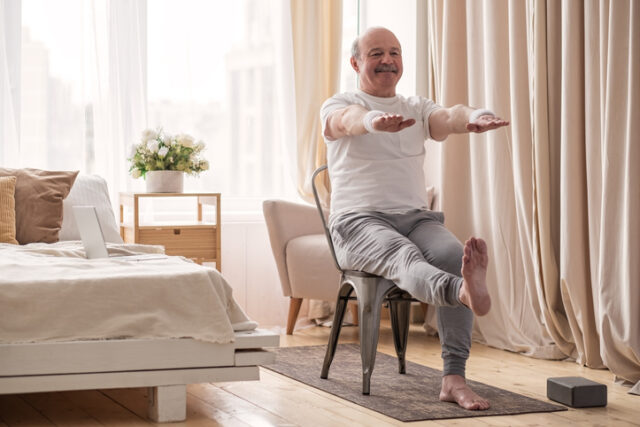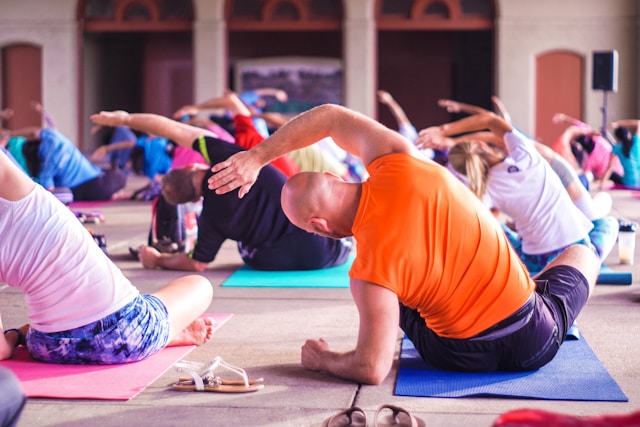If your body’s been creaking like an old staircase every time you stand up, you’re not alone—and no, you’re not just “getting old.”

Chances are, your posture might be the culprit. From slouched shoulders to the infamous tech neck, bad posture has a way of really messing up our bodies without much warning… until we’re suddenly walking like we slept in a bin. While you don’t have to become a yogi master or start taking ballet to figure out how to elongate your body, it’s important to realise how bad posture can leave you in loads of pain and with a serious lack of mobility.
1. Slouching feels comfy… until it doesn’t.

Let’s be honest: slouching feels good in the moment. You’re relaxed, you’re melting into the sofa, and your spine is shaped like a question mark. Of course, after an hour or two (or, let’s be real, four), your back starts sounding the alarm with every little movement.
Our bodies weren’t designed to fold like origami. That lazy slouch puts extra pressure on your spine and surrounding muscles, which means more aches, more stiffness, and a lot more muttering “ugh” every time you stand up.
2. Your phone has turned you into a turtle.

Scroll long enough, and suddenly, you’re hunched over like you’re guarding a tiny treasure. Tech neck is real, and it comes from craning your head forward for hours, whether you’re texting, TikToking, or reading this article right now (busted).
Your head’s surprisingly heavy, and when it’s angled forward for long stretches, your neck and shoulders take the hit. Over time, this can cause tightness, tension, and the charming feeling that your spine’s slowly turning into a coat hanger.
3. You’re sitting like a pretzel at your desk.

If you work at a desk, odds are you’ve spent at least part of the day with one leg tucked under you, leaning on one elbow, or slowly sinking further into your chair until you’re practically horizontal. It’s okay—we’ve all been there.
Problem is, those comfy-but-wonky positions twist your body out of alignment. When one side is doing more work than the other, you get imbalances, and that’s when those mysterious twinges and shoulder pangs start creeping in for a surprise visit.
4. Your shoulders live somewhere near your ears.

Stress likes to settle in the shoulders, and without even realising, you could be holding tension like you’re bracing for impact all day long. If your shoulders have slowly migrated north, and you’re always clenching without knowing why, that stiffness makes total sense.
Poor posture only makes this worse. The more you round your shoulders forward, the harder it is for those muscles to properly relax. And before you know it, your neck’s in a knot, and you’re reaching for the heating pad… again.
5. You think “standing straight” means puffing out your chest.

There’s a common myth that good posture equals “military straight.” So what do people do? They stick their chest out, lock their knees, and hold their breath like they’re posing for an awkward school photo.
That’s not helping; it’s just replacing one kind of strain with another. Real posture is about gentle alignment, not rigid posing. If it feels like a workout just to stand still, your body’s probably working overtime trying to keep up.
6. You ignore your core (and no, not just for abs).

We hear “core strength” and instantly picture ab workouts and fitness influencers. However, your core is about way more than appearance; it’s your body’s built-in support system, and when it’s weak, everything else picks up the slack.
If your core isn’t doing its job, your back and shoulders are going to step in, and they’re not designed for that kind of constant strain. That’s why even basic posture can feel exhausting if your middle’s not pulling its weight.
7. You spend most of the day in “C” shape.

Think about how your body’s shaped when you’re at your desk, in the car, on the sofa, or even at the dinner table. If you’re constantly rounded over, you’re living in what some call “C-curve” posture, and your spine’s not loving it.
This shape compresses your discs and stretches your back muscles in all the wrong ways. It might feel natural because we do it so often, but that doesn’t mean it’s good for you. Your spine wants a gentle “S,” not a sad little “C.”
8. Your feet don’t touch the ground when you sit.

It might seem harmless to dangle your legs like you’re on a swing set, but posture starts at the base. If your feet aren’t grounded, the rest of your body’s working overtime to stay stable, and usually not in the best way. Whether it’s crossing your legs or perching on the edge of the seat, these small habits can throw off your alignment and eventually cause those lower back aches you’ve been blaming on “sleeping weird.”
9. Your posture ends the second you sit down.

Most people think of posture as a “standing” thing. You straighten up when you walk into a room, but the second you sit? Game over. You melt into the chair like it’s quicksand and figure the damage has already been done. Of course, sitting posture matters just as much, if not more, since most of us are parked at desks or sofas for hours. Paying attention to your spine and shoulders while seated can save you a lot of soreness later on.
10. Your bag is basically a workout.

Whether it’s a purse, backpack, or tote, carrying your life around on one shoulder does more damage than you’d think. Your body shifts to compensate, muscles get tight on one side, and before you know it, everything feels a little off.
Switching sides, lightening the load, or even going hands-free with a properly-fitted backpack (yes, both straps) can make a surprisingly big difference. Your spine will thank you, and you might actually stop walking like you’ve been hit by a shopping trolley.
11. You only stretch when something already hurts.

Stretching isn’t just a recovery tool; it’s a posture protector. But many of us only stretch when our back’s already complaining or our neck feels like it’s made of cement. By then, it’s a bit late to be preventative.
Working in some gentle stretches throughout the day (especially chest and upper back) can undo hours of hunching and help keep you feeling looser, longer. And no, you don’t have to do a full yoga flow. Even a doorway stretch counts.
12. You underestimate how much posture affects your mood.

Sounds dramatic, but posture and mood are more connected than most people realise. Slouching can actually make you feel more tired, foggy, or down, while upright posture can help improve alertness and boost your energy (no extra coffee required).
The way you carry yourself sends signals to your brain, and when you’re slumped and folded in on yourself, it’s not just your body that feels low. Standing tall isn’t about looking confident for other people; it’s about giving your body and brain a bit of a lift, too.




